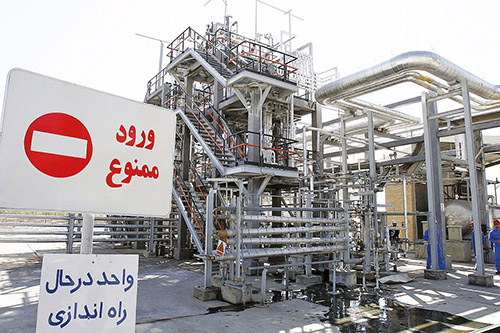
The Iranian regime appears just a few months away from obtaining nuclear weapons, all while the Biden administration is completely silent and has not articulated any clear policy for preventing this dangerous and predatory regime from becoming a nuclear state like North Korea.
Israeli Defense Minister Benny Gantz told ambassadors from countries on the United Nations Security Council during a briefing at the Foreign Ministry in Jerusalem on August 4, 2021:
“Iran has violated all of the guidelines set in the JCPOA [Joint Comprehensive Plan of Action] and is only around 10 weeks away from acquiring weapons-grade materials necessary for a nuclear weapon. … Now is the time for deeds—words are not enough. It is time for diplomatic, economic and even military deeds, otherwise the attacks will continue.”
The Biden administration has been insisting on reviving the disastrous Obama nuclear deal and the theocratic establishment of Iran has evidently seen this as a perfect opportunity to buy time and inch closer to acquiring nuclear weapons.
The Biden administration first showed its desperation by making it clear to the Iranian leaders that the U.S. wanted to return to the nuclear deal and was willing to lift all sanctions reimposed by the Trump administration.
As nuclear talks began, the Iranian regime began advancing its nuclear program at a faster pace as the negotiations went on. The Biden administration not only remained silent in the face of Iran’s violations, it also started offering even more concessions to the mullahs. The Biden administration, for instance, announced not only that it was willing to lift nuclear-related sanctions, but also that it was considering lifting non-nuclear-related sanctions.
Iran first began increasing uranium enrichment to 20% in January 2021. On January 9, the Iranian parliament passed a law requiring the government to expel the International Atomic Energy Agency’s nuclear inspectors. In April, the regime raised its uranium enrichment level to 60%, edging closer to weapons-grade levels. While his government was holding indirect nuclear talks with the Biden administration, Mohammad Bagher Qalibaf, speaker of Iran’s parliament, bragged:
“The young and God-believing Iranian scientists managed to achieve a 60% enriched uranium product. I congratulate the brave nation of Islamic Iran on this success. The Iranian nation’s willpower is miraculous and can defuse any conspiracy.”
On July 6, while the Geneva nuclear talks were ongoing, the regime began producing enriched uranium metal. The International Atomic Energy Agency (IAEA), the UN nuclear watchdog group, warned:
“Today, Iran informed the Agency that UO2 (uranium oxide) enriched up to 20 percent U-235 would be shipped to the R&D laboratory at the Fuel Fabrication Plant in Esfahan, where it would be converted to UF4 (uranium tetrafluoride) and then to uranium metal enriched to 20 percent U-235, before using it to manufacture the fuel.”
A joint statement issued by the U.K., France and Germany agreed that the Iranian regime “has no credible civilian need for uranium metal R&D and production, which are a key step in the development of a nuclear weapon.”
The Biden administration, in addition, has made no efforts to pressure the Iranian regime into answering the International Atomic Energy Agency’s questions about three undeclared clandestine nuclear sites found in Iran. IAEA Director General General Rafael Mariano Grossi stated:
“Iran must decide to cooperate in a clearer manner with the agency to give the necessary clarifications. The fact that we found traces (of uranium) is very important. That means there is the possibility of nuclear activities and material that are not under international supervision and about which we know not the origin or the intent. That worries me.”
Grossi also warned:
“The lack of progress in clarifying the agency’s questions concerning the correctness and completeness of Iran’s safeguards declarations seriously affects the ability of the agency to provide assurance of the peaceful nature of Iran’s nuclear program. For objectivity’s sake, I should say that the Iranian government has reiterated its will to engage and to cooperate and to provide answers, but they haven’t done that so far. So I hope this may change, but as we speak, we haven’t had any concrete progress.”
It seems—worryingly, especially after failures of both intelligence and planning in the Afghanistan debacle—that the Biden administration is again standing idly by while the mullahs of Iran comfortably keep enriching uranium to acquire a nuclear weapons arsenal.
We have seen what the ruling mullahs do to their own people and the region even before they have nuclear weapons. Just take a look at what the country called “the world’s greatest sponsor of state terrorism” has already done both domestically to their own people and internationally to Lebanon, Yemen, Libya, Iraq, Syria, Saudi Arabia, the Palestinian territories and even Venezuela and larger South America—not to mention a recent deadly attack on a commercial oil tanker in the Gulf of Oman. What then is the Free World expecting the mullahs to do after they have nuclear weapons?
Dr. Majid Rafizadeh is a business strategist and adviser, Harvard-educated scholar, political scientist, board member of Harvard International Review, and president of the International American Council on the Middle East. He has authored several books on Islam and U.S. foreign policy. He can be reached at Dr.Rafizadeh@Post.Harvard.Edu.









